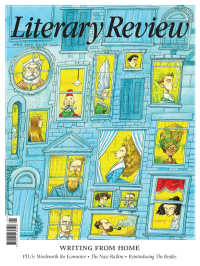Patrick Scrivenor
The Best Fun You Can Have Standing Up
Casting Shadows: Fish and Fishing in Britain
By Tom Fort
William Collins 359pp £20
‘Angling’, Dr Johnson famously remarked, ‘I can only compare to a stick and a string, with a worm at one end and a fool at the other.’ He might more kindly have said ‘an optimist at the other’, because fishing is the act of maintaining hope in the face of the most discouraging setbacks. Tom Fort is certainly an optimist. One of his previous books is called The A303: Highway to the Sun, and you can’t get more optimistic than that.
Fort’s writings cover a wide range of subjects. He therefore brings to this book a more practised pen than most angling writers bring to theirs and avoids the main pitfalls of the genre: cod philosophy, close-to-nature mystic vapourings and the banging of factional drums (of which angling yields far more than its fair share). He is scrupulously even-handed and refrains from taking sides in the bitter dispute – almost entirely void of purpose or substance – that once racked the world of trout fishing on chalk streams: floating fly versus sunk fly. He is equally impartial when it comes to the far more important and prolonged feud between netsmen and rod anglers on Britain’s salmon rivers.
Casting Shadows is part history, part personal reminiscence and part lament. Fort uses his experiences of angling as pegs on which to hang the story of fishing in Britain. He visits streams, rivers, estuaries, lakes, ponds and canals all over the country and places fishing in its social, commercial and

Sign Up to our newsletter
Receive free articles, highlights from the archive, news, details of prizes, and much more.@Lit_Review
Follow Literary Review on Twitter
Twitter Feed
Under its longest-serving editor, Graydon Carter, Vanity Fair was that rare thing – a New York society magazine that published serious journalism.
@PeterPeteryork looks at what Carter got right.
Peter York - Deluxe Editions
Peter York: Deluxe Editions - When the Going Was Good: An Editor’s Adventures During the Last Golden Age of Magazines by Graydon Carter
literaryreview.co.uk
Henry James returned to America in 1904 with three objectives: to see his brother William, to deliver a series of lectures on Balzac, and to gather material for a pair of books about modern America.
Peter Rose follows James out west.
Peter Rose - The Restless Analyst
Peter Rose: The Restless Analyst - Henry James Comes Home: Rediscovering America in the Gilded Age by Peter Brooks...
literaryreview.co.uk
Vladimir Putin served his apprenticeship in the KGB toward the end of the Cold War, a period during which Western societies were infiltrated by so-called 'illegals'.
Piers Brendon examines how the culture of Soviet spycraft shaped his thinking.
Piers Brendon - Tinker, Tailor, Sleeper, Troll
Piers Brendon: Tinker, Tailor, Sleeper, Troll - The Illegals: Russia’s Most Audacious Spies and the Plot to Infiltrate the West by Shaun Walker
literaryreview.co.uk